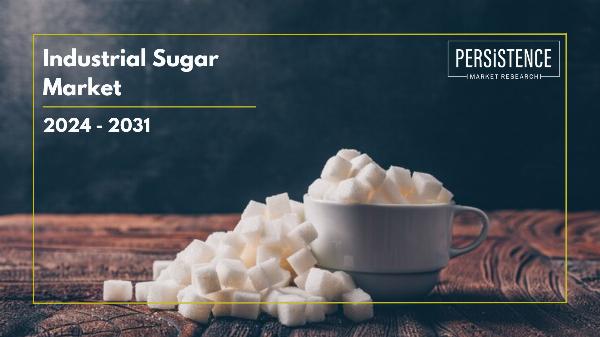How Is Consumer Demand Shaping the Industrial Sugar Market?

Strong 8k brings an ultra-HD IPTV experience to your living room and your pocket.
In recent years, the industrial sugar market has experienced significant transformations, driven largely by changing consumer demands. These shifts are not just altering how sugar is produced and consumed, but also influencing broader trends within the food and beverage industry. Understanding the impact of consumer preferences on the industrial sugar market provides valuable insights into future industry developments.
The Industrial Sugar market involves the production and supply of sugar used primarily in manufacturing and processing industries. This market includes various types of sugar such as granulated, powdered, liquid, and specialty sugars utilized in the food and beverage, pharmaceutical, and chemical industries. The global industrial sugar market is experiencing steady growth due to increasing demand for processed foods and beverages, as well as rising applications in pharmaceuticals and other industrial sectors.
The Changing Landscape of Consumer Preferences
Consumer awareness and preferences have undergone a profound change in recent years. Health consciousness has surged, with more people becoming aware of the negative impacts of excessive sugar consumption on health. This shift has led to increased demand for healthier alternatives and a broader push towards reducing sugar intake across various segments of the population.
1. Health Consciousness and Sugar Reduction
One of the most significant factors shaping the industrial sugar market is the growing health consciousness among consumers. As evidence mounts linking high sugar consumption to various health issues such as obesity, diabetes, and heart disease, individuals are becoming more vigilant about their dietary choices. This awareness has driven a decline in the per capita consumption of sugar in many developed markets.
In response, food and beverage companies are reformulating their products to reduce sugar content. This trend is evident in the rise of "reduced sugar" or "no added sugar" products, which cater to health-conscious consumers. The industrial sugar market has had to adapt by producing sugar substitutes and low-calorie sweeteners to meet the evolving demands.
2. The Rise of Sugar Alternatives
The quest for healthier alternatives has given rise to a variety of sugar substitutes, such as stevia, agave syrup, and monk fruit extract. These alternatives are perceived as more natural or healthier options compared to traditional refined sugar. As a result, the demand for these substitutes is increasing, prompting manufacturers to diversify their product offerings.
The industrial sugar market has responded to this trend by investing in the development and production of these alternative sweeteners. However, the challenge lies in balancing the production of traditional sugar with the growing demand for these substitutes, which requires strategic shifts in manufacturing processes and supply chains.
Industry Adaptations and Innovations
To keep pace with changing consumer preferences, the industrial sugar market has seen several adaptations and innovations.
1. Reformulation and Product Innovation
Food and beverage manufacturers are increasingly focusing on reformulating their products to include less sugar. This involves not only reducing sugar content but also enhancing the taste and texture of products using alternative sweeteners. Innovations in food science are crucial in ensuring that these reformulated products meet consumer expectations in terms of flavor and overall quality.
The industrial sugar market has had to adapt by investing in research and development to support these innovations. This includes creating new types of sugar with different properties that can work effectively with lower sugar content.
2. Sustainable and Ethical Sourcing
Consumers are also becoming more concerned about the sustainability and ethics of the products they consume. This extends to sugar production, where issues such as environmental impact, fair trade practices, and labor conditions are increasingly in the spotlight.
The industrial sugar market is responding to these concerns by adopting more sustainable practices. This includes investing in sustainable agriculture, reducing the environmental footprint of sugar production, and supporting fair trade initiatives. These efforts not only address consumer concerns but also help in maintaining a positive brand image in a competitive market.
Request a sample copy: https://www.persistencemarketresearch.com/samples/16633
The Global Perspective
Consumer demand for healthier and more sustainable products is a global phenomenon, but its impact varies by region. In developed markets like North America and Europe, the decline in sugar consumption is more pronounced due to higher health awareness and stringent regulations. Conversely, in emerging markets, the demand for sugar remains robust, driven by population growth and rising incomes.
1. Regional Differences in Sugar Consumption
In regions where traditional sugar consumption is still high, there is a growing trend towards adopting sugar alternatives and healthier options. Companies are tailoring their strategies to accommodate these regional differences, offering a range of products that cater to local preferences and dietary habits.
2. Impact on Global Supply Chains
The shift in consumer demand is also affecting global supply chains. As countries adapt to new consumption patterns, the demand for sugar and its substitutes fluctuates. This can lead to changes in trade dynamics, pricing, and supply chain strategies. Companies operating in the industrial sugar market need to be agile and responsive to these global trends to remain competitive.
Future Outlook
The future of the industrial sugar market will likely be shaped by continued shifts in consumer preferences and advancements in technology. As health and sustainability concerns become even more pronounced, the industry will need to innovate and adapt continuously.
1. Technological Advancements
Technological advancements in agriculture and food science will play a critical role in shaping the future of the industrial sugar market. Innovations in crop production, processing techniques, and product development will help meet consumer demands for healthier and more sustainable sugar options.
2. Evolving Consumer Expectations
Consumer expectations are likely to continue evolving, with a growing emphasis on transparency, sustainability, and health. Companies that proactively address these expectations and align their strategies accordingly will be better positioned to succeed in an increasingly competitive market.
Consumer demand is profoundly shaping the industrial sugar market, driving changes in product formulation, production practices, and market dynamics. As consumers become more health-conscious and environmentally aware, the industry must adapt to meet these evolving expectations. By embracing innovation and sustainability, the industrial sugar market can navigate these changes and continue to thrive in a rapidly transforming landscape.
Read More:
• https://prnewssync.medium.com/what-are-the-emerging-technologies-in-the-industrial-sugar-market-3b0b6e2ccba1
• https://prnewssync.wordpress.com/2024/08/23/industrial-sugar-market-analysis-top-players-and-market-share/
• https://apsnewsmedia.blogspot.com/2024/08/how-is-industrial-sugar-market-adapting.html
Follow Us: LinkedIn | Medium | Twitter
Note: IndiBlogHub features both user-submitted and editorial content. We do not verify third-party contributions. Read our Disclaimer and Privacy Policyfor details.


